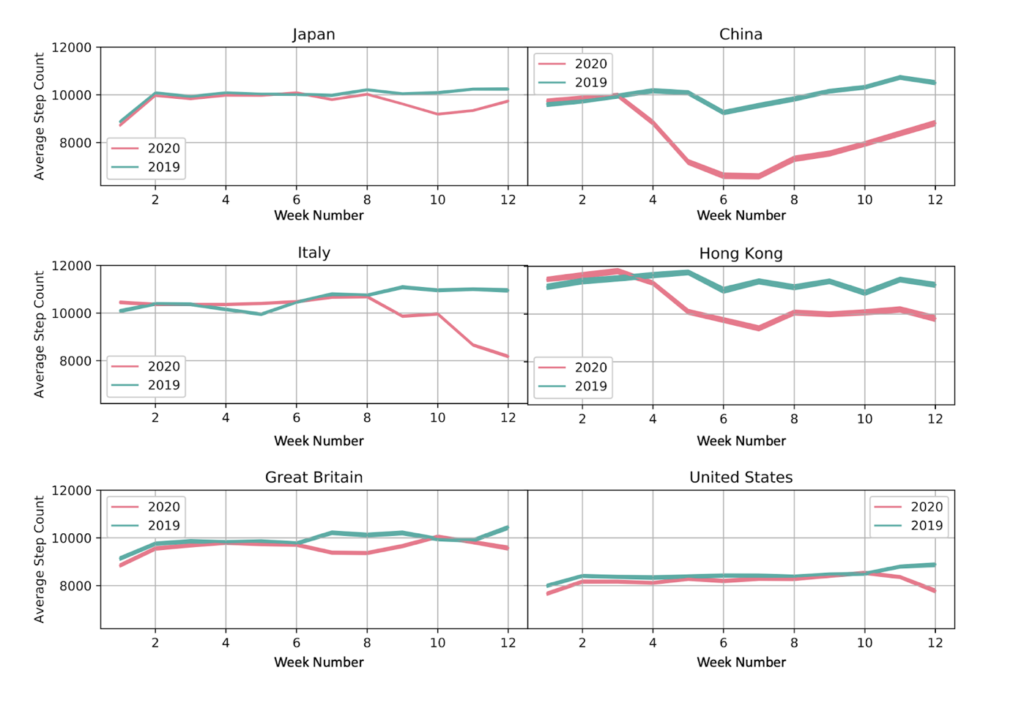This week’s curiosity box has
- Why is lockdown affecting sleep patterns?
- Do you burn more calories when you exercise in a hotter climate?
- How far do the roots of Voodoo go?
Sleep patterns during the lockdown
In just this week, four of my friends told me that their sleep pattern is “completely screwed”. Coincidence? I was not sure, so I conducted a short survey through Instagram.
From 87 responses, 57% agree that their sleep cycles are affected, and 66% of them are sleeping more. I am not surprised because these results are an indication of a world-wide phenomenon. Fitbit conducted a sleep-pattern study, and the results clearly show that people are sleeping more. Once you drill down the data by geography and age, the results get intriguing.
People are sleeping more and are more stressed – and why is this the case?
The first culprit is cortisol – the stress-causing hormone. Cortisol is not all bad because it regulates the activeness of our system. A primary driver for keeping the system active is the sun, i.e. light. Naturally, our bodies are meant to sync with the sun and term used for this is Circadian Drive. However, due to the lockdown, we have lesser exposure to the sun because we don’t go out frequently. Subsequently, we have increased our exposure to artificial light that comes from the many digital screens that surround us.

On a simultaneous track, we are releasing lesser Adenosine, a molecule that strengthens our sleep drive. We wouldn’t have a stable sleep drive because we are not as physically active as we would typically be.

Nevertheless, our efforts should be focused on setting our sleep patterns right because an irregular sleep cycle has a direct impediment to our immune system. And such times, we all need a healthier immune system. https://www.wired.co.uk/article/coronavirus-sleep.
Does exercising in a hotter climate burn more calories?
A calorie is the amount of energy it would take to raise the temperature of 1 kg of water by 1 degree Celsius.
We use calories as a measure to calculate the amount of energy our body needs and expends to function daily. And in a fitness routine, everyone strives for a perfect balance between calories consumed and calories burnt. The struggle is hard because food labels only help us in making a rough estimate of how many calories we consume. The unanswerable question is how many calories do we burn?
To answer that question, there are so many schools of thought and debate strewn across the internet. One particular discussion that piqued my brain is – Do we burn more calories when we exercise in a hotter climate? I continued my research on that question, and it was hard to find a consensus. But in my view, we burn more calories when we exercise in a hotter climate.
Long story short, an exercise in a hotter climate makes your heart work more and circulate more blood to cool your body down. Workouts in colder weather ease the workload of our body, i.e. to maintain body temperature. A study was done to test an athlete’s performance, doing the same exercise at different temperatures. The results concluded that in an environment where the temperature is moderate to high, the athlete burnt more calories.
There are many other factors such as duration of exercise, appetite, and workout type, that we need to keep in mind for this debate. If you would like more, please comment below with your questions, and I will be more than happy to expand my explanation.
The roots of Voodoo
Scooby-Doo introduced me to the concept of Voodoo. The culprit in that episode had dolls of the gang and was able to control them using pins that were pricked into them.

Unfortunately, I am a victim of misrepresentation of Voodoo by pop-culture and Hollywood.
The term Voodoo means spirit and the roots go all the way to Benin in Africa (https://theculturetrip.com/africa/ghana/articles/11-fascinating-facts-you-didnt-know-about-voodoo/). Like Benin, Voodoo is recognised as a religion in many parts in Africa. Voodoo has lots of music, dance, and spirits representing the different elements like rain, fire and so on.
The one thing that fascinated me about the Voodoo culture is the Zangbeto. Zangbetos are the spirits that protect the land. Dressed like haystacks, they move around during the night to drive away criminals, and they are highly revered during festivals.
According to Ogu legend, there are no humans inside the haystack when it moves. It is believed that they are controlled by the spirit of the night. I watched a few videos and after inspection, and I was not able to spot anyone entering the haystack. Do such spirits exist and control the Zangbetos? I don’t know.
Thank you @noodle_god for the suggestion to look into the Voodoo culture in Benin.
a 10-minute read that summarises all the questions and answers that piqued my curiosity.
I think we burn more calories when we exercise in colder climate, because of our body’s ability to form something called the ‘brown fat’ when exposed to colder environment, which apparently helps in burning more calories.
Would love to know more about the reasons why you think it is the opposite.
And also , do you think the altitude would affect calorie burning?
Yes, brown fat is something I stumbled upon during reading. I was only able to find information on how brown fat is formed during rest phase, not during exercise. If you dive a bit deeper on the brown fat angle, you can not isolate it only to exercise, you will have to see the bigger picture (i.e. what happens during the whole day) A study found that if you expose yourself to cold climate (like working in a very cold office where the AC’s temperature is set very low), you burn only an excess of 180 calories for the whole day. Which is not a lot. Subsequently you eat more in a colder climate. So the net calorie lost after exercise is not high. In a hotter weather, you naturally eat less. Some tend to drink cold water (which is the only negative calorie food you can consume). So net calories lost will be higher.
The above explanation is general statement for a larger population. It won’t hold true if we bring up specific individuals 😛
Nice article Arun. Though I partially agree with your answer to, “Does exercising in a hotter climate burn more calories?”, I also partially disagree. I think the solution to the question is rather person dependent just because of each person’s specific metabolism rate. In fact, in humans, BMR
(basal metabolic rate) is directly proportional to a person’s lean body mass, meaning the more lean body mass a person has, the higher their BMR ([1],[2]). Hence, a person with a high BMR who does not exercise, but maintains their standard diet also tends to maintain calorie intake to calorie expenditure ratio. However, given the multitude of things people do each day in either climates, we also have to agree that health and fitness related variables such as hormone secretions, workout efficiency, workout styles, workout times, diet, sleep .etc are confounded, making arguments as such debatable (hence my version of debatable answer). So, in my opinion, there are only advantages and disadvantages to exercising in either climates, not necessarily one leads to greater calorific loss.
References:
[1] Manini TM (2010). “Energy expenditure and aging”. Ageing Research Reviews. 9 (1): 1–11. doi:10.1016/j.arr.2009.08.002. PMC 2818133. PMID 19698803.
[2] McMurray RG, Soares J, Caspersen CJ, McCurdy T (2014). “Examining variations of resting metabolic rate of adults: a public health perspective”. Medicine & Science in Sports & Exercise. 46 (7): 1352–1358. doi:10.1249/MSS.0000000000000232. PMC 4535334. PMID 24300125.
Arun, this question triggered another question I had in mind, “Are diet, health and fitness related recommendations controversial because people try to fit a one size fits all model or are the results from animal studies subjecting us humans to confirmation bias, thus making us take up any one side?
Combining my reply in one here. To your latter question, I would look at the marketplace dynamics to see which school of thought the community is tiltimg towards. I think the marketplace is highly saturated because there is no litmus test sort of methods to find what workout is best suited for a particular person. Speaking of diet, it reminds me of the sudden uproar of demand for (and still widely sought) “fat-free” products. On a tangent to this, I see a slight communication gap on food labels. the calorie label indicates how many calories are there in the food item, not how many calories your body consumes.
which goes to your former comment
There are too many parameters as you have rightly listed out. Adding more to the list – genetics, calories consumed, and type of food (after biriyani for lunch I would have least motivation to do workout in the evening – pongal is the worst). I was perhaps subjected to confirmation bias because slightly. But if you see,it is tied to my previous observation which is – there is no easy to test how your body reacts. the deeper you go into fitness the more complex it gets. So, when I found the case that took one athelete and put him under the same routine in different temperatures, and the resulting calories lost, I positioned my article to remain at a high-level explanation (with a lot of assumptions in place ofcourse).
Thanks for your reply. Pongal is nothing short of sleeping pill in disguise 😂. You bring out another underlying flaw being made by food manufacturers -assumptions. In the name of marketing (fat-free, sugar-free .etc) diet recommendations being made by certain companies avoid stating assumptions which might help people make an informed dietary choice. As a result, there is high uncertainty amongst people when it comes to making the right food/diet choices. Anyways, I seem to be getting off topic. Thanks for the article, and for addressing a still controversial topic. I look forward to your next.
Nice and interesting
I think Hot Yoga must also be beneficial
Oh my my….very interesting…..the haystack moving. About calories….wish I knew the real effective secret…you have left out India .? For the step count…